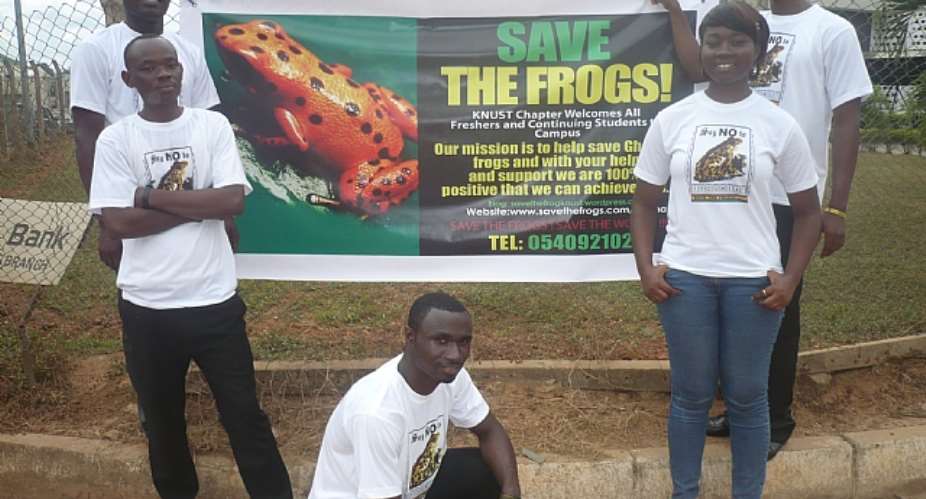Kumasi, GHANA, September 12, 2012 - SAVE THE FROGS! Ghana has won a grant amount of £ 6,000 (GHS 17,770) from the Rufford Small Grants Foundation to slow down frogmeat eating and trade in Northern Ghana. The Rufford-funded project is one year-long and has two phases – recording what kinds and the quantities of frogs harvested or traded and raising public awareness of the threats frogs are facing. The project covers Northern Ghana.
Worldwide statistics on the frog trade indicate that humans are eating frogs to extinction. It is estimated that between 100 million and a billion frogs are taken from the wild for food each year. The first-ever study on the trade conducted in West Africa in 2010 revealed that thirty-two traders handled approximately 2.7 million frogs per year, and there could be as many as 100s of traders involved in the trade. Ghana was not part of this study. However, preliminary reports suggest that frogmeat is the cheapest source of protein source among rural dwellers in Northern Ghana and frog meat traders could be exporting to neigbouring countries especially Burkina Faso. SAVE THE FROGS! Ghana will conduct interviews and market surveys and will be interested as well in actors involved including frog harvesters, middlemen, traders and consumers as well as the markets and trade-routes.
SAVE THE FROGS! Ghana would seize the opportunity to build the capacity of undergraduate students at northern Ghana's university, University for Development Studies, in protecting the region's frogs. The former SAVE THE FROGS! Ghana KNUST Chapter President and the Team Leader for the project, Henry Howard Abuaku says, “Upcoming ecologists living in Northern Ghana have very limited opportunities to interact with ecologists other than their own lecturers. I know how much this capacity building would mean to the students.”
Frogs found in northern Ghana like everywhere else feed on a variety of organisms such as agricultural pests and mosquito larvae, reducing the amount of agrochemicals usage, and the incidence of mosquito-related diseases such as malaria. Some of the northern Ghana's frogs are also used for native medicine such as anti-venom cures for scorpion stings and for other specific illnesses. SAVE THE FROGS! Ghana Executive Director, Gilbert Adum says “It is just sad - how many people know frogs matter this much and even more, let alone that frogs face several threats? Through this project we hope to influence people or even as far as their cultures, positively for the protection of frogs.” The project has employed three local people from three northern Ghana districts who have been tasked to collect proverbs and folktales about frogs. Gilbert Adum says the proverbs and folktales will lend evidence to the root cause of the problem of frog eating but more importantly will shed insight into indigenous wisdom for the protection of frogs. He adds that “it is important to speak to local people in the language –proverbs- they understand”. The project will also organize weekly radio programmes on northern Ghana's three leading Radio Stations, URA Radio (Bolgantaga), Nabiina Radio (Navrongo) and Builsa Radio (Sandema). Video shows and talk presentations will also be made at schools and community centres.





 Meta releases new version of conversational AI across its platforms
Meta releases new version of conversational AI across its platforms
 Cape Town named Africa’s Best Airport 2024 by Skytrax
Cape Town named Africa’s Best Airport 2024 by Skytrax
 Bono East: Four injured after hearse transporting corpse crashes into a truck
Bono East: Four injured after hearse transporting corpse crashes into a truck
 ‘Be courageous, find your voice to defend our democracy’ — Sam Jonah urges journ...
‘Be courageous, find your voice to defend our democracy’ — Sam Jonah urges journ...
 Exodus of doctors, nurses and teachers have worsened because of unserious Akufo-...
Exodus of doctors, nurses and teachers have worsened because of unserious Akufo-...
 2024 election: Avoid insults, cutting down people in search of power – National ...
2024 election: Avoid insults, cutting down people in search of power – National ...
 ‘You passed through the back door but congratulations’ — Atubiga on Prof Jane Na...
‘You passed through the back door but congratulations’ — Atubiga on Prof Jane Na...
 Government’s $21.1 billion added to the stock of public debt has been spent judi...
Government’s $21.1 billion added to the stock of public debt has been spent judi...
 Akufo-Addo will soon relocate Mahama’s Ridge Hospital to Kumasi for recommission...
Akufo-Addo will soon relocate Mahama’s Ridge Hospital to Kumasi for recommission...
 We must not compromise on our defence of national interest; this is the time to ...
We must not compromise on our defence of national interest; this is the time to ...
